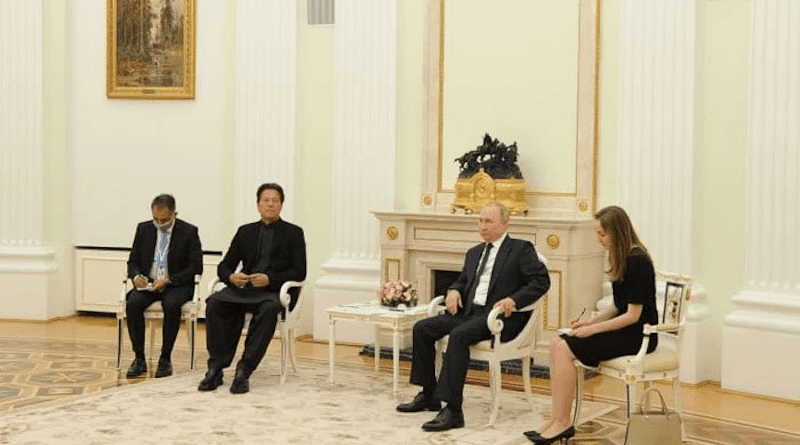Pakistan’s Ties With Russia – OpEd
The Pakistani Prime Minister Imran Khan’s visit to Moscow comes as tensions rise in a region on the brink of a full-scale conflict with global ramifications. Tensions have risen since Russian President Vladimir Putin sent troops into two Ukrainian regions that declared independence, increasing the likelihood of a larger conflict. As a consequence, Pakistan does not want to seem biassed in a war scenario. A challenging situation for Pakistan’s Prime Minister.
If Russia invades Ukraine, foreign policy experts may have to cope with the fallout. Pakistan openly supports Ukraine’s territorial integrity and sovereignty. But Pakistan’s stance would need to be carefully considered. The potential of a confrontation appears to dominate this voyage. The rising Russian-American enmity is escalating the Ukraine scenario. Pakistan’s last official visit to Moscow was almost two decades ago. It is notable that the two nations could reconcile during a moment of global transformation. Because the area is poised for a major political shift, the voyage’s timing is critical.
Moscow-Islamabad high-level collaboration has grown in recent years. Sergey Lavrov, Russia’s Foreign Minister, visited Islamabad in April, heralding a new era in bilateral ties. Despite stronger commercial and economic ties, the two nations have many interests when it comes to mutual protection. Since 2016, the two nations have been collaborating on military exercises, for example during Gen. Bajwa’s visit to Russia in 2018. The worsening of US-Pakistan ties has forced Washington to reconsider numerous foreign policy initiatives. As a result, their friendship has become stronger. This feature has improved ties with both China and Russia. Iran has joined China and Russia as targets of the US’ rising enmity. Recent events have brought the Beijing-Moscow axis closer to Pakistan. While Pakistan may seem impartial, the withdrawal of US troops from Afghanistan has moved Islamabad closer to China and Russia.
Islamabad and Moscow are mostly on the same page on Afghanistan and other regional issues. As a consequence, both cities have committed to work together with the Shanghai Cooperation Organization to combat the rising menace of ISIS. When the US leaves Afghanistan, they will likely address economic cooperation and regional issues. However, President Putin’s actions may have a significant influence on the public’s perception of current global issues. Moscow has designated two separatist groups in eastern Ukraine as “republics,” the Russian news reports. Separatist troops established the Donetsk and Luhansk People’s Republics (PPRs) in 2014 in eastern Ukraine.
Ukraine’s desire to join NATO has provoked criticism on both sides of the border. Russia sees NATO’s eastward expansion as a deliberate ploy to keep it out of the group’s defence alliance. Moscow looks to be worried about Nato’s eastward expansion. The US and its Western allies agreed not to interfere in Russia’s sphere of influence in return for not interfering in their own. When Russia took Crimea in 2014, tensions rose. Despite the fact that a UN resolution said that the land was already Ukrainian, the US imposed economic sanctions on Russia.
In reaction to the escalation of the conflict between the Ukrainian government and insurgents, Russia sent hundreds of soldiers to its border, complicating matters. The Russian administration has always stated that the US is wrong in claiming Russia invaded Ukraine in 2014. Putin’s Monday remarks heightened the situation and raised the risk of an inadvertent collision. This has helped bridge a rift between the US and several of its Western allies who questioned President Biden’s tough position on Russia and favoured a diplomatic approach. Currently, the public seems unenthusiastic about it. Russia has acknowledged the separatist pockets, and the US has retaliated by tightening sanctions.
China, for example, may struggle to comprehend President Putin’s tough attitude. Despite the Biden administration’s unpopular policies, the existing situation endures. Their friendship has grown stronger over time. The Russian President Vladimir Putin and Chinese President Xi Jinping said in a joint statement following their recent meeting in Beijing that they would work together for a long time. According to China, NATO should not be enlarged in the future as agreed by Russia and China in that speech. Xi Jinping, though, has always favoured Ukraine’s independence. “Respect and protection” of Ukraine’s sovereignty are necessary, according to Chinese Foreign Minister Wang Yi. Unlike Putin’s prior statements on Ukraine, this one is a complete 180.
In the event of military action against Ukraine, the alliance may be jeopardised. China is Ukraine’s second-largest trading partner. Ukraine and Pakistan have long-standing security relations. Pakistan has an important role to play in the global upheavals, but it must safeguard its own interests. Even though ties with Moscow have improved, the US does not favour one nation over another in global affairs.
*The author holds an M.Phil from National Defence University and freelance writer and can be reached at [email protected].

